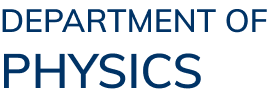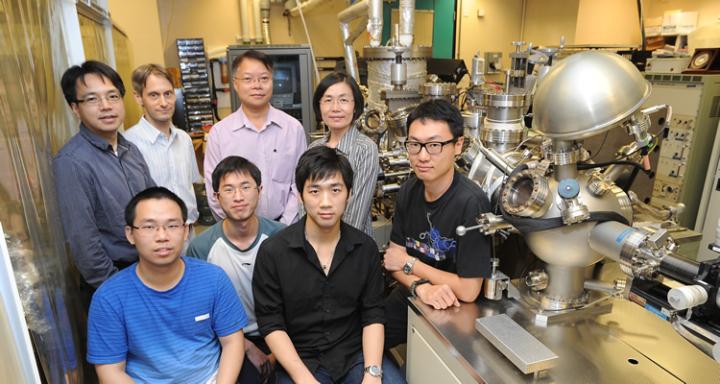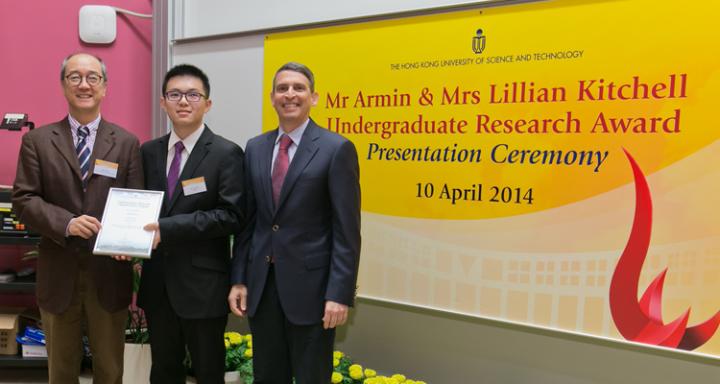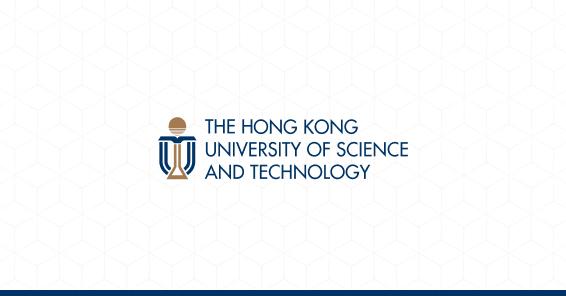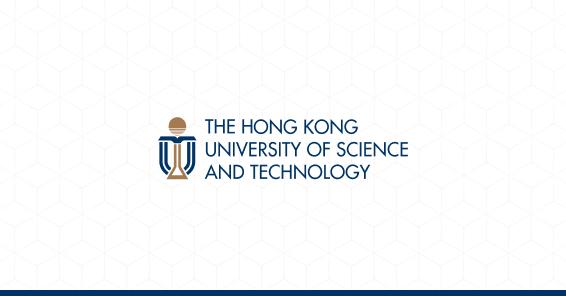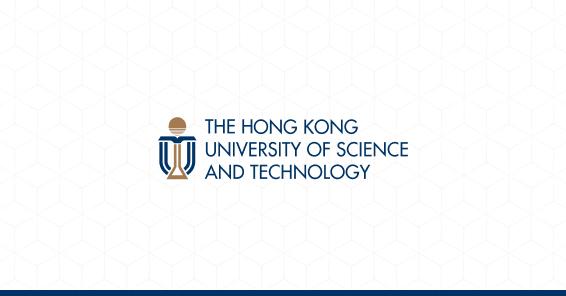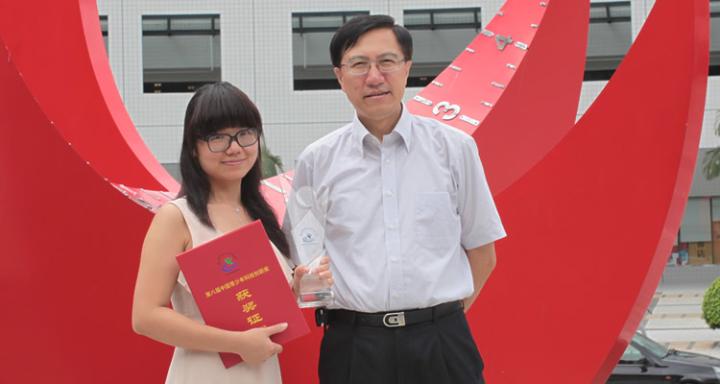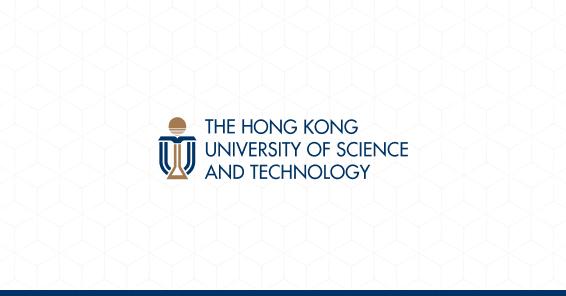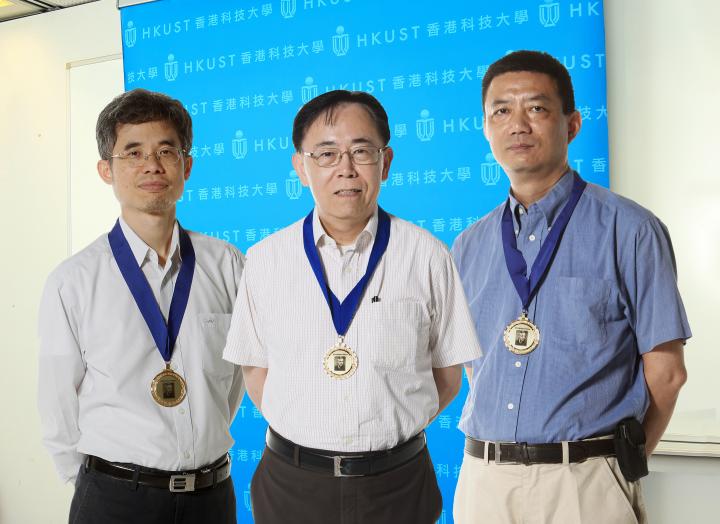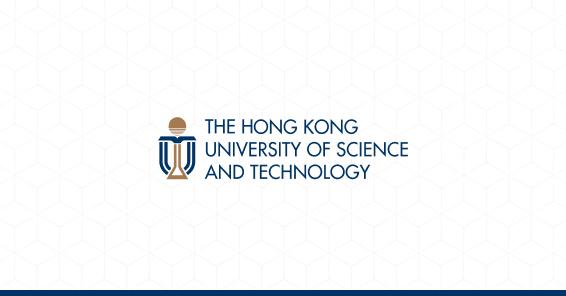News & Events
2014-07-06
A research team from the Department of Physics at the Hong Kong University of Science and Technology (HKUST) has achieved a scientific breakthrough by demonstrating that a two-dimensional superconductivity occurs at the interface between two new classes of materials. The groundbreaking discovery in the emerging field of topological superconductors could advance the development of a practical fault-tolerant quantum computer with unusually high computing power, and data storage abilities. The findings were recently reported in a paper entitled “Two-dimensional superconductivity at the interface of a Bi2Te3/FeTe heterostructure” that was published in the prestigious journal Nature Communications.
The research was carried out by a collaborative team comprised of Prof Iam-keong Sou, Prof Jiannong Wang, Prof Rolf Lortz and Prof Kam-tuen Law together with their postgraduate students and postdoctoral associates. They successfully fabricated two materials, Bi2Te3 and FeTe, using a technique called Molecular Beam Epitaxy. The very rare two-dimensional superconductivity that was discovered at the interface between these two novel materials when they are put together occurs despite the fact that neither of them is itself superconducting.
Bi2Te3 belongs to a new class of material called “Topological Insulator”, which behaves as an insulator at its interior while its surface is a conductor. FeTe is a parent compound of another new class of material called “iron-based chalcogenide superconductors”. Under certain conditions, a topological insulator can be transformed to a topological superconductor, with the very desirable property that it conducts electricity with no resistance. Theoretical physicists have predicted that a mysterious quasi-particle called the “Majorana fermion” can be trapped and detected in a topological superconductor. Prof Sou explained that the successful manipulation of Majorana fermions would facilitate a quantum leap in our computational and data storage abilities. He highlighted that conventional semiconductor-based computers in use today have almost reached their physical limits of computing power and data storage capability. A quantum computer based on the superposition principle in quantum mechanics can increase the capability in computing power and data storage tremendously.
Back in 1937, the Majorana fermion was predicted to exist and has been intensively sought by physicists ever since. A dream computer using Majorana fermions as the basic units is called the topological quantum computer. Majorana fermions are theoretically expected to appear in pairs. Even when one of the paired fermions is modified or damaged, the other could still provide the original information previously stored. This property makes a topological quantum computer very robust against local micro-disturbance and enables it to be fault-tolerant and practical for quantum computation. The topological superconductor developed by HKUST that supports Majorana fermions could lead to the invention of a practical quantum computer. Read more
The research was carried out by a collaborative team comprised of Prof Iam-keong Sou, Prof Jiannong Wang, Prof Rolf Lortz and Prof Kam-tuen Law together with their postgraduate students and postdoctoral associates. They successfully fabricated two materials, Bi2Te3 and FeTe, using a technique called Molecular Beam Epitaxy. The very rare two-dimensional superconductivity that was discovered at the interface between these two novel materials when they are put together occurs despite the fact that neither of them is itself superconducting.
Bi2Te3 belongs to a new class of material called “Topological Insulator”, which behaves as an insulator at its interior while its surface is a conductor. FeTe is a parent compound of another new class of material called “iron-based chalcogenide superconductors”. Under certain conditions, a topological insulator can be transformed to a topological superconductor, with the very desirable property that it conducts electricity with no resistance. Theoretical physicists have predicted that a mysterious quasi-particle called the “Majorana fermion” can be trapped and detected in a topological superconductor. Prof Sou explained that the successful manipulation of Majorana fermions would facilitate a quantum leap in our computational and data storage abilities. He highlighted that conventional semiconductor-based computers in use today have almost reached their physical limits of computing power and data storage capability. A quantum computer based on the superposition principle in quantum mechanics can increase the capability in computing power and data storage tremendously.
Back in 1937, the Majorana fermion was predicted to exist and has been intensively sought by physicists ever since. A dream computer using Majorana fermions as the basic units is called the topological quantum computer. Majorana fermions are theoretically expected to appear in pairs. Even when one of the paired fermions is modified or damaged, the other could still provide the original information previously stored. This property makes a topological quantum computer very robust against local micro-disturbance and enables it to be fault-tolerant and practical for quantum computation. The topological superconductor developed by HKUST that supports Majorana fermions could lead to the invention of a practical quantum computer. Read more
2014-06-16
The Undergraduate Research Opportunities Program (UROP) – a signature program at the Hong Kong University of Science and Technology to give undergraduate students an early taste of research under the guidance of faculty members, has nurtured many young talented researchers since its launch in 2005. Year 2 Physics student Ho-tat Lam, champion of the University Research Award this year, will attend two international conferences this summer to share with scholars worldwide his new research findings.
Admitted to the HKUST at the age of 16, Ho-tat began his first research project in the same year and had since then published two research papers under the guidance of his mentor – Prof Kwok-yip Szeto from the Department of Physics. After his project “Damage Spreading on Network” won 2014 Mr Armin & Mrs Lillian Kitchell Undergraduate Research Award, he went on to study network reliability, and came up with a groundbreaking solution to a decade-old problem that could greatly enhance the reliability of networks such as power grids, internet and social media networking system under limited resources. He will deliver his findings to an audience of scholars at two academic conferences in Poland and Canada this summer.
“Undergraduates can make significant and original contributions to research as well,” HKUST President Prof Tony Chan said. “Young students have fresh minds and may propose new approaches that even senior researchers haven’t considered.”
The scale and impact of UROP have grown over the years. The number of participating students had jumped five times to 353 in the eight years to 2012-13, while the number of faculties who joined the program has more than tripled to 140 during the same period. There are now 294 UROP projects on offer, up from 65 in 2005.
Prof Michelle Yik, Division of Social Science and Director of UROP, said it was encouraging to see so many students benefited from the program. “UROP illustrates beautifully the unique feature of research-embedded teaching. Students are able to take part in faculty-led research in any discipline.”
Six UROP students were awarded in the latest Undergraduate Research Award. The championship went to Physics student Ho-tat Lam, the first runners-up were Hongzi Mao, also a Physics student and Xiao Chen from the Department of Marketing, the second runners-up were Mathematics student Yixin Wang, Economics student Ziyan Chen, and Computer Engineering student Clarissa Cyrilla Prawoto. Read more
Admitted to the HKUST at the age of 16, Ho-tat began his first research project in the same year and had since then published two research papers under the guidance of his mentor – Prof Kwok-yip Szeto from the Department of Physics. After his project “Damage Spreading on Network” won 2014 Mr Armin & Mrs Lillian Kitchell Undergraduate Research Award, he went on to study network reliability, and came up with a groundbreaking solution to a decade-old problem that could greatly enhance the reliability of networks such as power grids, internet and social media networking system under limited resources. He will deliver his findings to an audience of scholars at two academic conferences in Poland and Canada this summer.
“Undergraduates can make significant and original contributions to research as well,” HKUST President Prof Tony Chan said. “Young students have fresh minds and may propose new approaches that even senior researchers haven’t considered.”
The scale and impact of UROP have grown over the years. The number of participating students had jumped five times to 353 in the eight years to 2012-13, while the number of faculties who joined the program has more than tripled to 140 during the same period. There are now 294 UROP projects on offer, up from 65 in 2005.
Prof Michelle Yik, Division of Social Science and Director of UROP, said it was encouraging to see so many students benefited from the program. “UROP illustrates beautifully the unique feature of research-embedded teaching. Students are able to take part in faculty-led research in any discipline.”
Six UROP students were awarded in the latest Undergraduate Research Award. The championship went to Physics student Ho-tat Lam, the first runners-up were Hongzi Mao, also a Physics student and Xiao Chen from the Department of Marketing, the second runners-up were Mathematics student Yixin Wang, Economics student Ziyan Chen, and Computer Engineering student Clarissa Cyrilla Prawoto. Read more
2014-04-01
Prof Yilong Han received the Achievement in Asia Award (Robert T. Poe Prize, å…¨çƒè¯äººç‰©ç†å’Œå¤©æ–‡å¸æœƒ,亞洲æˆå°±çŽ) by the International Organization of Chinese Physicists and Astronomers (OCPA).
Read more
2014-01-28
The Hong Kong University of Science and Technology (HKUST) PhD student Zhang Shanchao, Department of Physics, has won the 2013 Young Scientist Award. Zhang was awarded the honor in the Physical/ Mathematical Science category for the project “Coherent Quantum Interaction Between Photons and Atoms”. He also received the Best Poster Award for his poster on “Single-Photon Absorption and Reemission in Two-Level Cold Atoms” at the 21st Annual Conference of Hong Kong Institution of Science. Another PhD student Chen Shuming from the Department of Electronic and Computer Engineering, received the runner-up prize in the Engineering Science Category with his project on white organic light-emitting diodes (WOLEDs).
Now in its 12th year, the Hong Kong Young Scientist Awards scheme was established by the Hong Kong Institution of Science to recognize and honor promising young scientists and engineers in Hong Kong, and to promote science and technology development in the region.
In recent years, the study of light-matter interaction at the quantum level has drawn increasing attention not only because of its importance in better understanding fundamentals of the quantum world but also due to the promise it holds for potential applications in quantum information processing. As part of a major physics research group supervised by Prof Du Shengwang at HKUST investigating this area, Zhang’s main experimental research achievements were controlling and manipulating quantum interaction between photons and atoms, including the first observation of single-photon optical precursors, the realization of efficient photon-atom quantum interface, the invention of a novel dark-line two-dimensional magneto-optical trap, and the coherent control of single-photon absorption and reemission in a two-level atomic ensemble.
By using cold atoms in their magneto-optical trap, the research team demonstrated 49% single-photon storage efficiency of the optical memory, more than double the previously reported efficiency. Such high single-photon storage efficiency will bring the quantum light-matter interface closer to practical quantum information application, fostering quantum communications and quantum information networks. During Zhang’s PhD studies, he published a total of nine refereed journal research papers, including four in Physical Review Letters, two as the first author.
Supervised by Prof Kwok Hoi Sing, Chen Shuming’s research focuses on white organic light-emitting diodes (WOLEDs) for displays and lighting applications. One of the big challenges for WOLEDs is to maintain high efficiency without losing the color rendering index (CRI). By designing advanced device structures, engineering emission spectra, developing effective light out-coupling mechanisms, he was able to achieve a WOLED with high efficiency of 66 lm/W and a high CRI of 92. The developed WOLEDs have been applied in 4 inch displays/lighting panels, and pilot produced in a start-up company. Chen has published over 30 SCI papers on international journals including Advanced Functional Materials, Organic Electronics with more than 800 citations.
The Hong Kong Institution of Science was established in 1992 to foster the development of science in Hong Kong and to facilitate links with scientific communities in Mainland China, Taiwan and overseas. The Institution has nearly 400 members, covering physical science, life science, engineering science and mathematics, and actively supports the development of innovation and technology in Hong Kong. In this year’s Young Scientist Award, members of the audience at the venue were able to vote for awardees for the first time, accounting for up to 15% of the overall assessment. Read more
Now in its 12th year, the Hong Kong Young Scientist Awards scheme was established by the Hong Kong Institution of Science to recognize and honor promising young scientists and engineers in Hong Kong, and to promote science and technology development in the region.
In recent years, the study of light-matter interaction at the quantum level has drawn increasing attention not only because of its importance in better understanding fundamentals of the quantum world but also due to the promise it holds for potential applications in quantum information processing. As part of a major physics research group supervised by Prof Du Shengwang at HKUST investigating this area, Zhang’s main experimental research achievements were controlling and manipulating quantum interaction between photons and atoms, including the first observation of single-photon optical precursors, the realization of efficient photon-atom quantum interface, the invention of a novel dark-line two-dimensional magneto-optical trap, and the coherent control of single-photon absorption and reemission in a two-level atomic ensemble.
By using cold atoms in their magneto-optical trap, the research team demonstrated 49% single-photon storage efficiency of the optical memory, more than double the previously reported efficiency. Such high single-photon storage efficiency will bring the quantum light-matter interface closer to practical quantum information application, fostering quantum communications and quantum information networks. During Zhang’s PhD studies, he published a total of nine refereed journal research papers, including four in Physical Review Letters, two as the first author.
Supervised by Prof Kwok Hoi Sing, Chen Shuming’s research focuses on white organic light-emitting diodes (WOLEDs) for displays and lighting applications. One of the big challenges for WOLEDs is to maintain high efficiency without losing the color rendering index (CRI). By designing advanced device structures, engineering emission spectra, developing effective light out-coupling mechanisms, he was able to achieve a WOLED with high efficiency of 66 lm/W and a high CRI of 92. The developed WOLEDs have been applied in 4 inch displays/lighting panels, and pilot produced in a start-up company. Chen has published over 30 SCI papers on international journals including Advanced Functional Materials, Organic Electronics with more than 800 citations.
The Hong Kong Institution of Science was established in 1992 to foster the development of science in Hong Kong and to facilitate links with scientific communities in Mainland China, Taiwan and overseas. The Institution has nearly 400 members, covering physical science, life science, engineering science and mathematics, and actively supports the development of innovation and technology in Hong Kong. In this year’s Young Scientist Award, members of the audience at the venue were able to vote for awardees for the first time, accounting for up to 15% of the overall assessment. Read more
2013-10-07
Ms Lin Wang, a PhD candidate in the Department of Physics at the Hong Kong University of Science and Technology (HKUST), has received the Chinese Youth Science and Technology Innovation Prize in recognition of her outstanding achievements in innovative science. Ms Wang also became the only young scientist in Hong Kong to receive the Young Scientist Award this year. The Young Scientist honor, presented by the European Materials Research Society (E-MRS), was awarded in recognition of her breakthrough research on the study of two-dimensional graphene structures containing resonant impurities, and their novel properties and physical mechanisms.
The Chinese Youth Science and Technology Innovation Prize was set up in 2004 to commemorate the centenary of Deng Xiaoping's birth. Awards are presented annually to students from universities, secondary and primary schools. E-MRS, founded in 1983, enjoys international acclaim as a professional organization in materials science. Every year, the Society invites leading international scientists to review and nominate young scientists who have made remarkable contributions and show great potential in areas of materials science and technology.
The presentation ceremony for the Young Scientist Award was held in conjunction with the 30th anniversary spring meeting of E-MRS in France, exploring the theme "The route to post-Si CMOS devices: from high mobility channels to graphene-like 2D nanosheets". Graphene is a thin layer of carbon atoms arranged in a hexagonal lattice structure and the world's thinnest, stiffest and most conductive nanomaterial. Its ultra low electrical resistivity makes it an ideal material for next-generation electronics, as it is comparably thinner and more conductive. It can be used to make transparent touch screens, light-emitting panels or solar batteries.
Ms Wang is Hong Kong's only young scientist to receive the Young Scientist Award for research findings on graphene. She was the first to deploy quantum capacitance measurement methods to detect the existence of resonant impurities in graphene and successfully observed the negative quantum capacitance exhibited by graphene at a high adulteration level. Her research opens new avenues to understanding the disorder effects in two-dimensional graphene material and their correlations with physics' strongly correlated two-dimensional electron systems. It has also enriched controlling methods of graphene's nanostructure and enhanced the potential for technology applications, for example, in low-power electronic devices and high-sensitivity detectors for geographical and medicinal purposes.
At the E-MRS award presentation ceremony, Ms Wang presented three reports on the modifications of electronic properties of top-gated graphene devices using ultra-thin yttrium oxide layers; the detection of resonant impurities in graphene through quantum capacitance measurement; and negative quantum capacitance induced by midgap states in single-layer graphene.
Ms Wang commenced her doctoral studies in the Department of Physics at HKUST in 2009. Under the supervision of Prof Ning Wang, she has primarily focused on fabrication and study of the physical properties of nanomaterials and made important discoveries in two-dimensional graphene structures containing impurities and various disorders. She has authored and co-authored 18 papers published in leading international journals. Read more
The Chinese Youth Science and Technology Innovation Prize was set up in 2004 to commemorate the centenary of Deng Xiaoping's birth. Awards are presented annually to students from universities, secondary and primary schools. E-MRS, founded in 1983, enjoys international acclaim as a professional organization in materials science. Every year, the Society invites leading international scientists to review and nominate young scientists who have made remarkable contributions and show great potential in areas of materials science and technology.
The presentation ceremony for the Young Scientist Award was held in conjunction with the 30th anniversary spring meeting of E-MRS in France, exploring the theme "The route to post-Si CMOS devices: from high mobility channels to graphene-like 2D nanosheets". Graphene is a thin layer of carbon atoms arranged in a hexagonal lattice structure and the world's thinnest, stiffest and most conductive nanomaterial. Its ultra low electrical resistivity makes it an ideal material for next-generation electronics, as it is comparably thinner and more conductive. It can be used to make transparent touch screens, light-emitting panels or solar batteries.
Ms Wang is Hong Kong's only young scientist to receive the Young Scientist Award for research findings on graphene. She was the first to deploy quantum capacitance measurement methods to detect the existence of resonant impurities in graphene and successfully observed the negative quantum capacitance exhibited by graphene at a high adulteration level. Her research opens new avenues to understanding the disorder effects in two-dimensional graphene material and their correlations with physics' strongly correlated two-dimensional electron systems. It has also enriched controlling methods of graphene's nanostructure and enhanced the potential for technology applications, for example, in low-power electronic devices and high-sensitivity detectors for geographical and medicinal purposes.
At the E-MRS award presentation ceremony, Ms Wang presented three reports on the modifications of electronic properties of top-gated graphene devices using ultra-thin yttrium oxide layers; the detection of resonant impurities in graphene through quantum capacitance measurement; and negative quantum capacitance induced by midgap states in single-layer graphene.
Ms Wang commenced her doctoral studies in the Department of Physics at HKUST in 2009. Under the supervision of Prof Ning Wang, she has primarily focused on fabrication and study of the physical properties of nanomaterials and made important discoveries in two-dimensional graphene structures containing impurities and various disorders. She has authored and co-authored 18 papers published in leading international journals. Read more
2013-07-12
Two pioneering research projects at the Hong Kong University of Science and Technology (HKUST) led by Prof Che-ting Chan, Chair Professor of the Department of Physics and Prof Mingjie Zhang, Kerry Holdings Professor of Science of the Division of Life Science were awarded close to $100 million in total by the University Grants Committee (UGC) under its Sixth Round of Areas of Excellence (AoE) Scheme.
Prof Tony F Chan, President of HKUST said, "I am delighted about the tremendous support shown by UGC towards the University's research projects. As an international research university, HKUST has spearheaded interdisciplinary research to address the most pressing challenges facing our world. The two scientific research projects in life science and physics awarded AoEs are vivid proof of our world-leading standards. This is also a reflection of the research strength of our faculty members. Through close inter-institutional and cross-disciplinary research collaborations, we will create invaluable education and training opportunities to boost the standards and competitiveness of local scientific research and make greater contributions to society."
The following summarizes the HKUST projects awarded for the AoE Scheme:
"Novel Wave Functional Materials for Manipulating Light and Sound" By Prof Che-ting Chan, Chair Professor of the Department of Physics
The research team seeks to create a new generation of functional materials that go beyond the properties of normal ones and are capable of controlling the density of radiation modes in rendering more efficient light emitting devices and thermal radiation control. The materials are also expected to be able to bend and confine light and sound in unusual ways, equipping microscopes with better resolution and facilitating the design of efficient, lighter antennae and optical chips. In addition, the team will work on modifying the scattering and absorption properties of natural materials in order to achieve stealth, reduce noise and increase energy harvesting capability. Increase in local field strength will be another item on the research agenda leading to ultra-sensitive sensors, light manipulation of matter and strong nonlinear effects.
Through manipulating electromagnetic and acoustic waves, the research team will come up with new functional materials including photonic / phononic crystals, metamaterials and plasmonic structures. State-of-the-art nano-fabrication techniques will be employed in fabrication, gauging and verification of the material, which will then be applied on new devices.
The research team consists of partners from the Hong Kong Baptist University, Chinese University of Hong Kong, City University of Hong Kong and Polytechnic University of Hong Kong.
“Mechanistic Basis of Synaptic Development, Signaling and Neuro-disorders” By Prof Mingjie Zhang, Kerry Holdings Professor of Science of the Division of Life Science
This research aims to provide new theoretical grounding for understanding an array of neuro-disorders including autism, schizophrenia and depression, at the same time developing medicines and therapies to treat the disease-related effects. Genetic studies have consistently proved that hundreds of genes are associated with autism spectrum disorders, yet our understanding of underlying mechanisms governing the alterations of these genes and their role in causing the diseases is very much limited. For such reasons, the research team intends to systematically characterize the structure, function and interaction networks of a set of key synaptic proteins involved in synaptic development and signaling, while elucidating the impacts of such mutations on mental illnesses.
The research team will also develop peptides, peptide mimetics and low molecular weight chemical compounds which help bring about a greater understanding in the mechanistic basis of genetic disorders and represent potential therapies against mental disorders.
The research team is composed of partners from the Chinese University of Hong Kong and Polytechnic University of Hong Kong.
Read more
Prof Tony F Chan, President of HKUST said, "I am delighted about the tremendous support shown by UGC towards the University's research projects. As an international research university, HKUST has spearheaded interdisciplinary research to address the most pressing challenges facing our world. The two scientific research projects in life science and physics awarded AoEs are vivid proof of our world-leading standards. This is also a reflection of the research strength of our faculty members. Through close inter-institutional and cross-disciplinary research collaborations, we will create invaluable education and training opportunities to boost the standards and competitiveness of local scientific research and make greater contributions to society."
The following summarizes the HKUST projects awarded for the AoE Scheme:
"Novel Wave Functional Materials for Manipulating Light and Sound" By Prof Che-ting Chan, Chair Professor of the Department of Physics
The research team seeks to create a new generation of functional materials that go beyond the properties of normal ones and are capable of controlling the density of radiation modes in rendering more efficient light emitting devices and thermal radiation control. The materials are also expected to be able to bend and confine light and sound in unusual ways, equipping microscopes with better resolution and facilitating the design of efficient, lighter antennae and optical chips. In addition, the team will work on modifying the scattering and absorption properties of natural materials in order to achieve stealth, reduce noise and increase energy harvesting capability. Increase in local field strength will be another item on the research agenda leading to ultra-sensitive sensors, light manipulation of matter and strong nonlinear effects.
Through manipulating electromagnetic and acoustic waves, the research team will come up with new functional materials including photonic / phononic crystals, metamaterials and plasmonic structures. State-of-the-art nano-fabrication techniques will be employed in fabrication, gauging and verification of the material, which will then be applied on new devices.
The research team consists of partners from the Hong Kong Baptist University, Chinese University of Hong Kong, City University of Hong Kong and Polytechnic University of Hong Kong.
“Mechanistic Basis of Synaptic Development, Signaling and Neuro-disorders” By Prof Mingjie Zhang, Kerry Holdings Professor of Science of the Division of Life Science
This research aims to provide new theoretical grounding for understanding an array of neuro-disorders including autism, schizophrenia and depression, at the same time developing medicines and therapies to treat the disease-related effects. Genetic studies have consistently proved that hundreds of genes are associated with autism spectrum disorders, yet our understanding of underlying mechanisms governing the alterations of these genes and their role in causing the diseases is very much limited. For such reasons, the research team intends to systematically characterize the structure, function and interaction networks of a set of key synaptic proteins involved in synaptic development and signaling, while elucidating the impacts of such mutations on mental illnesses.
The research team will also develop peptides, peptide mimetics and low molecular weight chemical compounds which help bring about a greater understanding in the mechanistic basis of genetic disorders and represent potential therapies against mental disorders.
The research team is composed of partners from the Chinese University of Hong Kong and Polytechnic University of Hong Kong.
Read more
2013-06-19
The Hong Kong University of Science and Technology (HKUST) has achieved research breakthrough with a novel approach, using ultrathin lead nanowires to produce magnetic fields which are 200 times stronger and increase the temperature of the environment in which superconductors operate. The research, providing solutions to a bottleneck unsolved for over a century concerning low applications of superconductors due to ultra low temperatures and low magnetic critical fields required, is envisaged to greatly enhance superconductor-based technologies to facilitate their applications in medical and biological fields such as high-resolution Nuclear Magnetic Resonance Imaging (MRI) devices for cancer and stroke detection. The breakthrough research is published in the prestigious nanoscience and technology journal ACS Nano.
HKUST’s research, led by Prof Rolf Walter Lortz from the Department of Physics, is conducted by a cross-disciplinary team made up of Prof Ping Sheng from the Department of Physics, Prof Frank Leung-yuk Lam and Prof Xijun Hu from the Department of Chemical and Biomolecular Engineering, as well as researchers from the Department of Physics and the William Mong Institute of Nano Science and Technology. It addresses the longstanding issue of superconductors which, despite having their phenomenon known for more than 100 years, have had few applications because of the cold temperatures, low critical field, complex techniques and high costs required. High magnetic field applications are of particular interest since they are required for high resolution medical and biological imaging techniques. However, there has been little progress in the recent years to take the fields of superconducting electromagnets beyond the current limit of 21 Tesla.
HKUST’s team solved the problem regarding cold temperatures and low magnetic critical fields by demonstrating that the critical field of a standard elemental superconductor can be enhanced by a factor of 200 by nanostructuring the material. They invented an innovative chemical method using the porous silica material SBA-15 and infiltrating ultrathin lead nanowires with a diameter of six nm into the pores.The nanowires form a dense network of parallel wires which are so closely spaced that the superconducting properties of lead could be preserved on the tiny nanometer scale. With lead as the material, the critical field can be enhanced from only 0.08 Tesla to more than 15 Tesla. The team has also found a preparation technique which is relatively simple, affordable and transferrable to the production of similar nanostructured materials.
One of the main applications of superconductors is MRI, a harmless non-invasive technique for obtaining high-resolution images of soft tissue materials from the interior of the human body. The MRI technique is widely used for the detection of cancer, strokes or other diseases, and helps medical doctors monitor the recovery process in the human body. With HKUST’s breakthrough already enhancing the magnetic critical field superconductors, the quality of the MRI image is expected to significantly improve when the fundamental research contributes to applied research.
In order to push the upper limit of the magnetic field well beyond the magic value of 21 Tesla, HKUST’s team will embark on another stage to replace lead with other superconducting materials with higher intrinsic critical fields such as Niobium (Nb) or the widely-applied high-performance superconducting alloy Niobium Tin (Nb3Sn). Furthermore, the researchers aim at exploring the possibilities for a large scale production to enhance the materials’ applicability.
Read more
